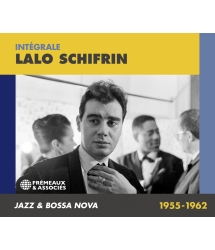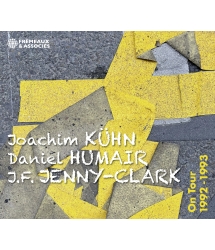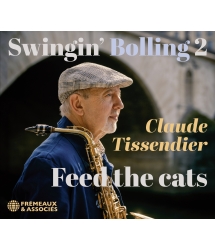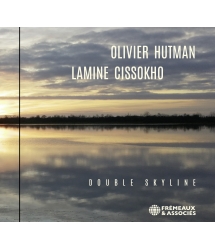- Our Catalog
- Philosophy
- Philosophers of the 20th century and today
- History of Philosophy (PUF)
- Counter-History and Brief Encyclopedia by Michel Onfray
- The philosophical work explained by Luc Ferry
- Ancient thought
- Thinkers of yesterday as seen by the philosophers of today
- Historical philosophical texts interpreted by great actors
- History
- Books (in French)
- Social science
- Historical words
- Audiobooks & Literature
- Our Catalog
- Jazz
- Blues
- Rock - Country - Cajun
- French song
- World music
- Africa
- France
- Québec / Canada
- Hawaï
- West Indies
- Caribbean
- Cuba & Afro-cubain
- Mexico
- South America
- Tango
- Brazil
- Tzigane / Gypsy
- Fado / Portugal
- Flamenco / Spain
- Yiddish / Israel
- China
- Tibet / Nepal
- Asia
- Indian Ocean / Madagascar
- Japan
- Indonesia
- Oceania
- India
- Bangladesh
- USSR / Communist songs
- World music / Miscellaneous
- Classical music
- Composers - Movie Soundtracks
- Sounds of nature
- Our Catalog
- Youth
- Philosophy
- News
- How to order ?
- Receive the catalog
- Manifesto
- Dictionnary











- Our Catalog
- Philosophy
- Philosophers of the 20th century and today
- History of Philosophy (PUF)
- Counter-History and Brief Encyclopedia by Michel Onfray
- The philosophical work explained by Luc Ferry
- Ancient thought
- Thinkers of yesterday as seen by the philosophers of today
- Historical philosophical texts interpreted by great actors
- History
- Books (in French)
- Social science
- Historical words
- Audiobooks & Literature
- Our Catalog
- Jazz
- Blues
- Rock - Country - Cajun
- French song
- World music
- Africa
- France
- Québec / Canada
- Hawaï
- West Indies
- Caribbean
- Cuba & Afro-cubain
- Mexico
- South America
- Tango
- Brazil
- Tzigane / Gypsy
- Fado / Portugal
- Flamenco / Spain
- Yiddish / Israel
- China
- Tibet / Nepal
- Asia
- Indian Ocean / Madagascar
- Japan
- Indonesia
- Oceania
- India
- Bangladesh
- USSR / Communist songs
- World music / Miscellaneous
- Classical music
- Composers - Movie Soundtracks
- Sounds of nature
- Our Catalog
- Youth
- Philosophy
- News
- How to order ?
- Receive the catalog
- Manifesto
- Dictionnary
AVEC ROMANE, FLORIN NICULESCU, DOUDOU CUILLERIER, LAURENT BAJATA ET PIERRE MAINGOURD, FRANCIS VARIS
ROMANE
Ref.: FA540
Label : Frémeaux & Associés
Total duration of the pack : 37 minutes
Nbre. CD : 1
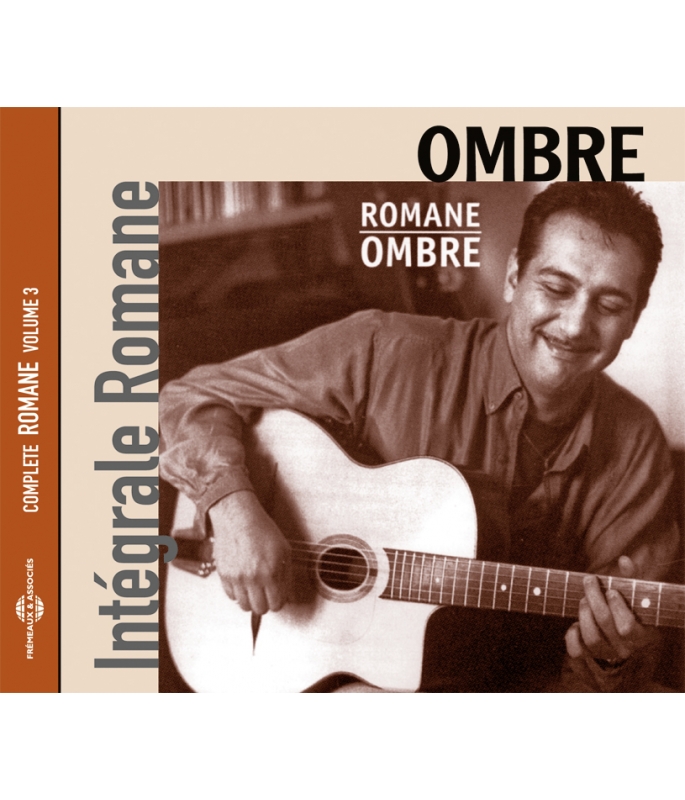
AVEC ROMANE, FLORIN NICULESCU, DOUDOU CUILLERIER, LAURENT BAJATA ET PIERRE MAINGOURD, FRANCIS VARIS
AVEC ROMANE, FLORIN NICULESCU, DOUDOU CUILLERIER, LAURENT BAJATA ET PIERRE MAINGOURD, FRANCIS VARIS
With the album Ombre – this is the third to be reissued in the Intégrale series of his collected recordings – Romane confirmed his place as a worthy heir to Django Reinhardt while renewing his partnership with the exceptional violinist Florin Niculescu. The expressive palette of Romane’s group had evolved thanks to the presence of such guests as Francis Varis (accordion), Marcel Cazes (clarinet) or Thomas Dutronc (guitar). Romane’s compositions here cover the entire musical universe which resulted in gypsy swing, with pieces both acoustic and electric, waltzes and ballads. By 1996, long before the current vogue for swing, Romane’s six-string guitar had reached the summits, and for any enlightened fan of Django’s music this record comes as a brilliant demonstration of his talents. B. Goldenstein & P. Frémeaux
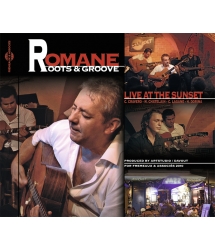
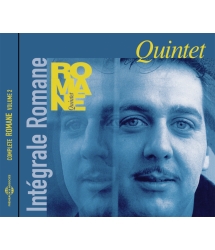
AVEC ROMANE, FLORIN NICULESCU, DOUDOU CUILLERIER,...
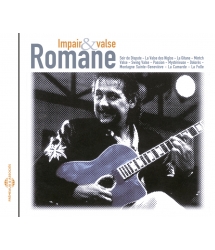
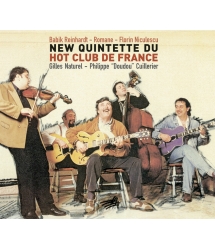
BABIK REINHARDT - ROMANE - FLORIN NICULESCU - GILLES...




-
PisteTitleMain artistAutorDurationRegistered in
-
1Gypsy fireRomane00:03:261996
-
2MonticelloRomane00:05:001996
-
3ManègeRomane00:02:521996
-
4PatrimonioRomane00:01:531996
-
5Jo s remakeRomane00:03:191996
-
6SélèneRomane00:04:171996
-
7Ombre (studio)Romane00:03:221996
-
8Chassés croisésRomane00:02:531996
-
9Chez FernandRomane00:04:031996
-
10Paris nashvilleRomane00:03:151996
-
11Ombre (film)Romane00:03:101996
OMBRE Intégrale Romane Volume 3 FA540
Ombre
Intégrale Romane Volume 3
1. Gypsy Fire (Romane) 3’21
2. Monticello (Romane) 4’57
3. Manège (Romane) 2’49
4. Patrimonio (Romane) 1’50
5. Jo’s Remake (Romane) 3’15
6. Selène (Romane) 4’15
7. Ombre (version studio) (Romane) 3’19
8. Chassés croisés (D. Sebastian) 2’50
9. Chez Fernand (M. Taylor) 4’00
10. Paris Nashville (Romane) 3’12
11. Ombre (version film) (Romane) 3’19
ROMANE : Guitare solo
Florin NICULESCU : Violon
Philippe « Doudou » CUILLERIER : Guitare rythmique
Laurent BAJATA : Guitare rythmique
Pierre MAINGOURD : Basse
Participation spéciale : Francis VARIS : Accordéon
Thomas DUTRONC : Guitare (dans les deux versions de «?Ombre?»)
Marcel CAZES : Clarinette (dans «?Ombre?» version film)
Romane joue sur guitare DUPONT
Francis Varis joue sur accordéon HOHNER
Editions musicales : Palass et Universal Publishing Production Music France, sauf 8 : copyright control?; et 9 : Mark Rowles Music LTD.
Enregistré en janvier 1996 au Studio Planète Sun. Ingénieur du son : Gilles RAVINET, assité de Sylvain.
Photos : Gilbert GIBDOUNY
Réalisation : George LEIBOVITZ. Production originale : Joël LEIBOVITZ Pour Iris Production.
Frémeaux & Associés cessionnaire 2010
www.fremeaux.com
1996 : Troisième opus de Romane?; on est alors curieux de voir comment le guitariste va renouveler son inspiration, sans perdre le charme de ses deux premiers disques, d’autant plus que l’équipe est la même (ou presque) que sur le disque précédent (Pierre Maingourg, contrebasse, Laurent Bajata et Doudou Cuillerier, guitares, Florin Niculescu, violon).
Romane ne faisant jamais deux fois le même disque, il a eu la bonne idée d’inviter Francis Varis, l’un des premiers instrumentistes à avoir participé au sein de Cordes et lames (groupe qu’il a co-fondé avec le guitariste Dominique Cravic) au renouveau de l’accordéon jazz?; cet excellent musicien qu’on a vu depuis aux côtés de jacques Bolognesi (au sein de Bolovaris), des Rumberos ou de Titi Robin, se coule naturellement dans l’univers de Romane (cf. son envolée sur Jo’s remake) qui confronte la tradition du jazz manouche à d’autres musiques populaires, et élargit sa palette sonore en électrifiant sa guitare sur quelques titres.
Voilà assurément un disque de plaisir où les musiciens ont de la place pour s’exprimer et rivalisent d’enthousiasme et de musicalité, notamment lors de questions-réponses enlevées (cf. sur Gypsy fire, ou Manège)?: verve et fluidité de Florin, souplesse et élégance de Varis dont l’accordéon touches-piano sonne parfois comme un accordina, inspiration et sérénité de Romane.
Avec «?Ombre?», Romane démontre brillamment qu’il sait renouveler un style tout en restant fidèle à son esthétique, notamment par l’apport de compos originales?: 9 ici sur 11 titres, qui confirment une vaine mélodique rare?; le public entend de nouveaux thèmes tout en ayant l’impression de déjà les connaître?; voila sans doute l’une des raisons qui font que la musique de Romane plaît. Composer l’a aussi aidé à se forger un langage mélodique propre?; il est très attentif au placement rythmique, à la façon dont il pose les notes. Romane joue la carte du calme et de la tranquillité, même s’il sait faire preuve de vélocité quand il faut?: aucune esbroufe, aucun bavardage mais une belle maturité d’improvisateur sachant faire chanter la note en conjuguant charme et panache. Des swings à la mise en place impeccable (Gypsy fire au thème imparable, Manège, le sautillant Jo’s remake ou Ombre qui donne son titre à l’album et dont le groupe donne deux versions) alternent avec de magnifiques ballades (Monticello, avec un superbe chorus de Romane qui poétise finement, ou le nonchalant et très convaincant Sélène qui évoque un après midi ensoleillé de Juillet au bord de l’eau : chorus remarquablement construits de Francis Varis, au joli son d’accordéon, et de Romane qui a électrifié son instrument avec ce qu’il faut de réverbe) et Patrimonio, valse enlevée dans la grande tradition du swing musette, autant de thèmes qui sonnent comme des standards. A signaler Chez Fernand (bistrot que Django fréquentait à Samois-sur-Seine), mélodie qui fait mouche à l’ambiance très parisienne, signée Martin Taylor, guitariste qui fut le partenaire de Stéphane Grappelli et avec lequel Romane croisa les cordes, à Samois notamment.
Parmi les innombrables héritiers de Django, il existe quelques guitaristes que sa musique n’a pas étouffés, mais a au contraire aidé à se révéler?; c’est le cas de Romane, musicien à la réelle personnalité, conjuguant passion et lucidité. Avec «?Ombre?», il démontre brillamment qu’il va s’inscrire durablement dans le paysage.
Francis Couvreux,
chroniqueur pour Frémeaux & Associés
www.djangostation.com
© Frémeaux & Associés
1996 saw Romane’s third opus. At the time, many were curious as to how the guitarist would renew his inspiration without sacrificing any of the charm of his first two albums: the musicians present were (more or less) the same as those who’d accompanied him on his previous outing – Pierre Maingourg (double bass), Laurent Bajata and Doudou Cuillerier (guitars) and Florin Niculescu (violin).
Romane – never one to make the same record twice – had the excellent idea of inviting along Francis Varis, one of the first instrumentalists to play with Cordes et lames, the group he co-founded with guitarist Dominique Cravic during the jazz accordion revival. An excellent musician – seen later with Jacques Bolognesi (in the Bolovaris group), the Rumberos or Titi Robin – he flows naturally into Romane’s universe (cf. his flights on Jo’s remake) where the leader confronts the gypsy jazz tradition with other popular music styles, and broadens the sound-palette with recourse to an electric guitar on some titles.
The result is an extremely enjoyable record where the musicians have room to express themselves, rivalling with each other in enthusiasm and musicianship notably in some spirited exchanges (cf. Gypsy fire or Manège): accompanying the serenely-inspired Romane, Florin Niculescu’s verve and fluidity find echoes in the flexible elegance of Francis Varis, whose piano-keyboard accordion sometimes sounds like an accordina.
Ombre is a brilliant demonstration of Romane’s ability to renew a style while remaining faithful to its aesthetics. More particularly, he has contributed new compositions to the repertoire. Nine of the eleven titles here are originals which confirm the presence of a rare melodic vein, with the result that his audiences can hear new tunes whilst under the impression that they know them already... which is no doubt one of the reasons why Romane’s music is so well-liked. Composing has also helped him forge his own musical language: the guitarist pays great attention to rhythm, and the way each note is to be placed. The reigning atmosphere here is calm, even if Romane can call on velocity if desired: no bluffing, no idle chatter, but a fine maturity as an improviser who knows how to make each note sing with charm and panache. Swing tunes are impeccably put together – Gypsy fire and its remorseless theme; Manège; the leaping Jo’s remake; Ombre, which gives the album its title and appears here in two separate versions – and they alternate here with magnificent ballads – Monticello, with a superb chorus from Romane, full of poetic finesse; the nonchalant yet totally convincing Sélène, reminiscent of a sunny June afternoon on the riverbank with remarkably-constructed choruses from Francis Varis (a pretty accordion-sound), and Romane with just the right amount of reverb on his guitar, electrified for the occasion – and even waltzes (cf. Patrimonio, a spirited piece in the great swing musette tradition). There can be no hesitation in saying that these sound like... standards. And let’s not forget Chez Fernand (actually a bistro in Samois-sur-Seine where Django was a regular visitor): the melody has a Parisian flavour that’s right on target, and it was written by Martin Taylor, the guitarist who partnered Stéphane Grappelli and who shared a stage with Romane on more than one occasion, notably in Samois.
There are some guitarists among Django’s countless heirs who weren’t hushed by his music: on the contrary, that music helped with their discovery. Romane is one of them, a musician of genuine character who conjugates passion and lucidity. With Ombre he brilliantly demonstrates that he’s here to stay.
Francis Couvreux, www.djangostation.com
English translation: Martin Davies
© Frémeaux & Associés
«Avec Ombre, troisième volume de son Intégrale, Romane affirme sa place de digne héritier de Django Reinhardt et retrouve, pour la seconde fois, l’exceptionnel violoniste Florin Niculescu. La palette d’expressions de la formation de Romane est encore développée, avec les participations exceptionnelles de Francis Varis (accordéon), Marcel Cazes (clarinette) ou Thomas Dutronc (guitare). Les compositions de Romane couvrent tout l’univers musical qui a donné le swing manouche (swing acoustique, électrique, valse, balade). En 1996, avant la mode actuelle du swing, Romane avait ainsi placé les six cordes de sa guitare très haut, très tôt. Ce disque en donne la preuve éclatante à tout amateur éclairé de la musique de Django.» Benjamin Goldenstein & Patrick Frémeaux
With the album Ombre – this is the third to be reissued in the Intégrale series of his collected recordings – Romane confirmed his place as a worthy heir to Django Reinhardt while renewing his partnership with the exceptional violinist Florin Niculescu. The expressive palette of Romane’s group had evolved thanks to the presence of such guests as Francis Varis (accordion), Marcel Cazes (clarinet) or Thomas Dutronc (guitar). Romane’s compositions here cover the entire musical universe which resulted in gypsy swing, with pieces both acoustic and electric, waltzes and ballads. By 1996, long before the current vogue for swing, Romane’s six-string guitar had reached the summits, and for any enlightened fan of Django’s music this record comes as a brilliant demonstration of his talents. B. Goldenstein & P. Frémeaux
CD OMBRE INTEGRALE ROMANE VOLUME 3, ROMANE © Frémeaux & Associés 2011(frémeaux, frémaux, frémau, frémaud, frémault, frémo, frémont, fermeaux, fremeaux, fremaux, fremau, fremaud, fremault, fremo, fremont, CD audio, 78 tours, disques anciens, CD à acheter, écouter des vieux enregistrements, albums, rééditions, anthologies ou intégrales sont disponibles sous forme de CD et par téléchargement.)
